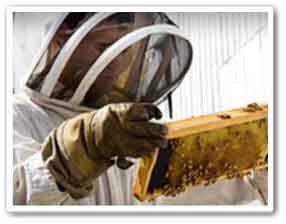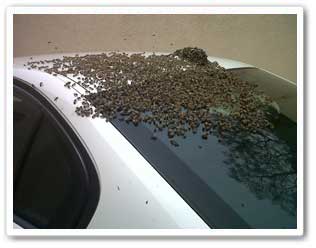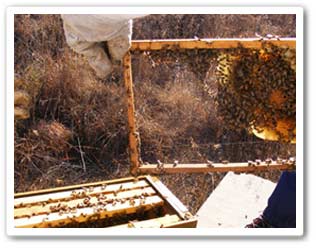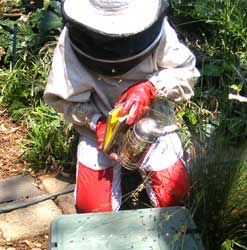Bee removal company
Lees gerus hierdie bladsy in Afrikaans
We are a company based in South Africa that specialises in
bee removals. We specialise
in removing bees from urban and suburban areas to relocate the bees
onto farms. Because bees can be a danger to people, it is best to let
professionals with the right equipment to remove bees from your home.
We are those professionals. Our expertise dates back many years, so
you can count on us to do a good job.
We remove bees in:
- Residential areas like houses, schools, water meters and playgrounds.
- Commercial areas like shops, hotels, restaurants, factories, offices
and many more locations.
- Urban areas like high rise buildings, train stations, bus stops,
roads and public buildings
- Wasp removals are part of our service
We are bee removers, not bee-keepers. Most bees are relocated to farms
where they are used to polinate crops and produce honey and bees wax.
We also sell bee hives to beginner bee keepers to get them started with
their trade.
Because we specialise in the removing of bees we subscribe to the codes
of conduct as laid out by the Bee Removers Association of South Africa.
(BRASA) Which ensures that we have safety at the top of our list of priorities.
We are not only bee removers but also bee-keepers and as such are registered with the department of agriculture to deal with bees and as part of this process procured public liability insurance to the value of R2 million.
Areas, Time and Cost of bee removals
We travel to most areas in
Johannesburg,
Cape Town
, Cape Town and
Pretoria.
Our areas in Johannesburg include, but are not exclusive to
Sandton,
Bryanston,
Randburg
and Fourways All that you have
to do, is to pick up the phone and call us. The cost depends on the
difficulty of removing the hive but most bee removals are standard.
Please call to discuss where your bees are and the best way of removing
them. As soon as the queen bee, bee nest or bee hive are found, all
that is left is to remove them, by placing them in a box or bee container.
Bees no longer have to be a problem to your home or office. We are the
solution to your problematic swarm.
Bee removal in Johannesburg has never been easier
Good quality bee removal service 
Bees are very mystical and important insects. They provide us with
sweet honey which is used for many healing and medical reasons. With
this in mind, we make sure to remove them as safely as possible, in
the process making sure to deliver a good quality service. Getting rid
of bees does to have to be a hassle any more, we are here to make sure
the job is done, quickly and safely. We try our level best to keep our
clients safe and happy, and also do our best not to harm the bees in
the process.
In this video we see how a bee remover takes bees from a bird box and
relocates them into a hive which he will leave at the same spot as the
bird box in order to orient the bees to their new home. This is a relatively
small colony of bees. He could not find the queen in order to isolate
her and encourage the othe bees to follow but she would have been in
the bird box surrounded by worker bees.
Bee removal in one's home
Most of us would get really worried at the sight of a large colony
of bees inhabiting our home. This is only natural seeing as bees are
known to sting. Having bees in your home when you are allergic
to bees is highly risky and could be life threatening. The best solution
to this problem would be to have the bees removed by a professional
from your home.
 There is
never a need to panic from the get-go. Bees generally take about 1-3
days to decide whether your home is suitable for them or not. But it
is smarter to not to wait until they settle and build a hive. Calling
a bee remover or a bee-keeper would be the best thing to do. If you
discover that a hive has been built by the bees at a late stage, do
not despair. The bees can still be removed from your home. There is
never a need to panic from the get-go. Bees generally take about 1-3
days to decide whether your home is suitable for them or not. But it
is smarter to not to wait until they settle and build a hive. Calling
a bee remover or a bee-keeper would be the best thing to do. If you
discover that a hive has been built by the bees at a late stage, do
not despair. The bees can still be removed from your home.
Bee removal methods differ. The bee-keeper will have his own way, and
the bee removal specialist will use his own method. Again, this depends
on whether the bees have built a hive or not and how much brood there is. The key to successful bee removal is to capture the queen and as many of the worker bees as possible. It is important
to get the queen into the box because wherever the queen goes, the rest
of the swarm will follow. Most bees are not aggresive unless you approach them or cut grass near them.
A bee removal specialist must be called in if a hive is already in
existence. It is best to approach bee hives early in the morning, or
late in the afternoon. This is when the bees are in their hive and least
likely to sting. He will have to find the hive and get rid of the  bees,
making sure to not leave any behind. He could: bees,
making sure to not leave any behind. He could:
- Trap the bees, and place them in a box
- Make the conditions in the hive uncomfortable and place a mobile replacement hive nearby
Killing the bees is never a great option because they benefit
the environment.
When the queen and as many of the worker bees are captured it is best to destroy the hive and remove as much of the bee infrastructure as possible.
Bees are never out to get us, generally they are just looking for a
place to build their hive, take care of their queen and make a little
bit of honey. The only danger with bees is the possibility of being
stung when one is allergic. Removing the bees serves them well because
they are moved to a much better and more controlled environment.
Whenever there is a bee infestation in one's home, it is always best
to have it removed before it causes any major problems.
What happens to the bees once we remove them?
In nature bees face a vast number of obstacles and threats in the form
of predators, lack of food sources and disease. The number of bees world
wide has started to dwindle and this is a concern to all of us because
of the far reaching impact this will have on the world food supply.
Chiefly for humane reasons we do our utmost not to harm the bees at
all. We remove bees rather than exterminate them. These bees are then
taken along with their queen and rehoused in hives. Once they have made
themselves at home we transport the hive in it's entirity to a farm
where the bees can continue to forage and expand their colony.
Bee Season
You may have heard the term 'Bee Season' before, this is how bee-keepers and others people dependent on bees refer to the period of activity in which bees become more visible an are seen to be pollinating plants and flowers and collecting pollen for their own larders.
Bees are less active in the colder months as the lower temperatures make it difficult for them to fly and the forage decreases. The chief purpose of bees during the colder months is to look after the queen, this means keeping her safe and warm. Worker bees will form a cluster around the queen and flutter their wings while vibrating their bodies in order to generate heat to keep her warm.
That bees choose to stay inside the hive for most of the season is considered by many to be hibernating.
As the warmer months approach more and more bees will leave the hive in an attempt to replenish the honey stores which will have been depleted during the winter months. They will have to fly far from the hive in order to look for any early blooming plants.
Once spring arrives and plants start to bloom the number of bees that are out and about will have increased dramatically. This is also when farmers have planted their crops and fruit trees will have their blossoms just waiting to be pollinated. If you worked or lived in a farming community or have a you own fruit trees and a vegetable garden you should see a great number of bees over the next 6 to eight months.
For as long as gardens are blooming it can be considered bee season. This is also why you may not notice if you have a bee infestation in your home or garden until the spring.
Bees have been known to inhabit strange venues, let's take a look at
some of the least expected places
bees have built their hives.
Last updated 7 January 2015
|




 There is
never a need to panic from the get-go. Bees generally take about 1-3
days to decide whether your home is suitable for them or not. But it
is smarter to not to wait until they settle and build a hive. Calling
a bee remover or a bee-keeper would be the best thing to do. If you
discover that a hive has been built by the bees at a late stage, do
not despair. The bees can still be removed from your home.
There is
never a need to panic from the get-go. Bees generally take about 1-3
days to decide whether your home is suitable for them or not. But it
is smarter to not to wait until they settle and build a hive. Calling
a bee remover or a bee-keeper would be the best thing to do. If you
discover that a hive has been built by the bees at a late stage, do
not despair. The bees can still be removed from your home. bees,
making sure to not leave any behind. He could:
bees,
making sure to not leave any behind. He could: